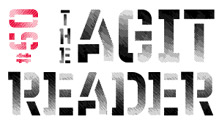
Something That Would Never Do
Violet Times
Cleveland, Ohio, early 1970s: a land of struggling industry, widespread unemployment, racial unrest, failing sports teams and cheap beer. Who said those were different times? There’s a reason the great city, despite being a shell of its former self, has yet to shed the “mistake on the lake” tag. The only things that have changed are the cars on the road and the bands in the bars. Back then there was something special going on in the dive clubs and abandoned lofts littered across the city’s west side, as a small group of free-thinking punks began to emerge from the silted shadows to forge a new style of rock & roll that would reflect not only Cleveland’s post-industrial grittiness but also its isolated strangeness. They would believe in the grooves of the Velvet Underground, the words of Bob Dylan, ESP records and little else.
Of all the first-wave post-Velvets groups to surface amongst the detritus of this era—and I’m talking on a national level here—Cleveland’s Mirrors were the ones who took it most to heart. And considering the lack of attention paid to lead songwriter Jamie Klimek, who would form the band in 1972, especially when compared to his lakeside contemporaries in Rocket From the Tombs, Electric Eels, etc. (you know the story), Mirrors were easily the most overlooked. Not that credit hasn’t been laid, as everything to Clinton Heylin’s excellent From the Velvets to the Voidoids book to the poorly distributed Hands in My Pocket compilation have attempted to highlight Klimek and company’s brilliance, but usually with a “what should’ve been” angle.
Well there’s no crying over spilt Black Label, especially since we now have Something That Would Never Do, a re-imagined long-player of the finest Mirrors recordings from ’74 and ’75. To say the release is a long time coming is an understatement, as much of this material has been haphazardly scattered across a handful of releases. It compiles all but one of the tracks from the Those Were Different Times three-way split (out of print for nearly a decade), the two tracks from their only record actually released in the ’70s (“Shirley” b/w “She Smiled Wild”, released on David Thomas’ Hearthen label in 1977), plus a few other choice cuts, all re-sequenced, expertly mastered and placed in a very nice LP package designed to look like it might have back in ’75. That means no liners and no information on the recordings (for that I recommend you check out Velvets to Voidoids).
Oh yeah, there’s the music, all of which is no less than essential. In a way, Mirrors were the throwbacks of Cleveland scene, never included in those pointless “who was the first punk band” discussions. I suppose their arrangements were a bit too detailed, the piano a little too flowery, for Mirrors to be punk. Not that they didn’t have enough kick to blow most bands from the era, including the Modern Lovers, another Velvets-obsessed outfit messing around a few hundred miles away, offstage with a single fuzz-out groove. Where Jonathan Richman sang about cute girls and being straight, Klimek howled about strange women while stirring up loose, raw rock & roll dervishes that ended up confusing most of the strange creatures inhabiting the area.
But it wasn’t all Velvets worship back then as Klimek seemed to imagine himself as a long-haired dropout version of Dylan, only more amplified and a bit less wordy, or better yet, Ray Davies on bad drugs. The band, featuring many of the gentlemen who were playing or would go on to play in the other groups that would write Cleveland’s punk history (including the late great guitarist Jim Jones), were perfectly adept at any number of styles, from sneering garage raves (“Annie,” penned by Craig Bell, who joined Mirrors to get with Klimek’s sister) to spaced-out sub-glam twinkles (“How Could I”) to coiled progressive monsters (see “Beaver Girls”). In fact you could call Simply Saucer their closest contemporary, a band formed around the same time, in the armpit of a different Great Lake, with more than a little Syd Barrett in their sound and Big Muffs on the floor. Of course others have followed this path, beginning with the Twinkeyz out West, the Harrisburg Players down in Southern Ohio, carrying torches all the way up to current outfits like Psychedelic Horseshit.
Unfortunately not much of the Mirrors’ influence could be as direct as the founding members had hoped. Label disinterest, along with a rapidly changing scene in Cleveland, led to their demise just as the gears were rolling. Klimek would join up with Mirrors key man Paul Marotta to start the more streamlined Styrenes almost immediately, but would re-form the Mirrors in the ’80s to record an album of old favorites. Something That Would Never Do, though, is Klimek’s new masterpiece of yore, a perfect encapsulation of his greatest statements finally collected on a single piece of wax, the way they were intended. It is one hell of a collection for fans of not just Cleveland rock & roll, but fans of simply fucking good rock & roll.
Doug Elliott
PAST PERFECTS
Miles Davis, Sketches of Spain
39 Clocks, Zoned
Company Flow, Funcrusher Plus
Nick Cave & the Bad Seeds, From Her to Eternity, The Firstborn Is Dead, Kicking Against the Pricks, and Your Funeral... My Trial
Stark Folk, Stark Folk
Dntel, Early Works For Me It It Works For You II
Cocteau Twins, The Pink Opaque
Ray Charles, Genius: The Ultimate Ray Charles Collection
Red Red Meat, Bunny Gets Paid
Chris Darrow, Chris Darrow and Under My Disguise
Beth Orton, Trailer Park
Various Artists, Downriver Revival
Isaac Hayes, Black Moses and Juicy Fruit (Disco Freak)
Death, ...For the Whole World to See
